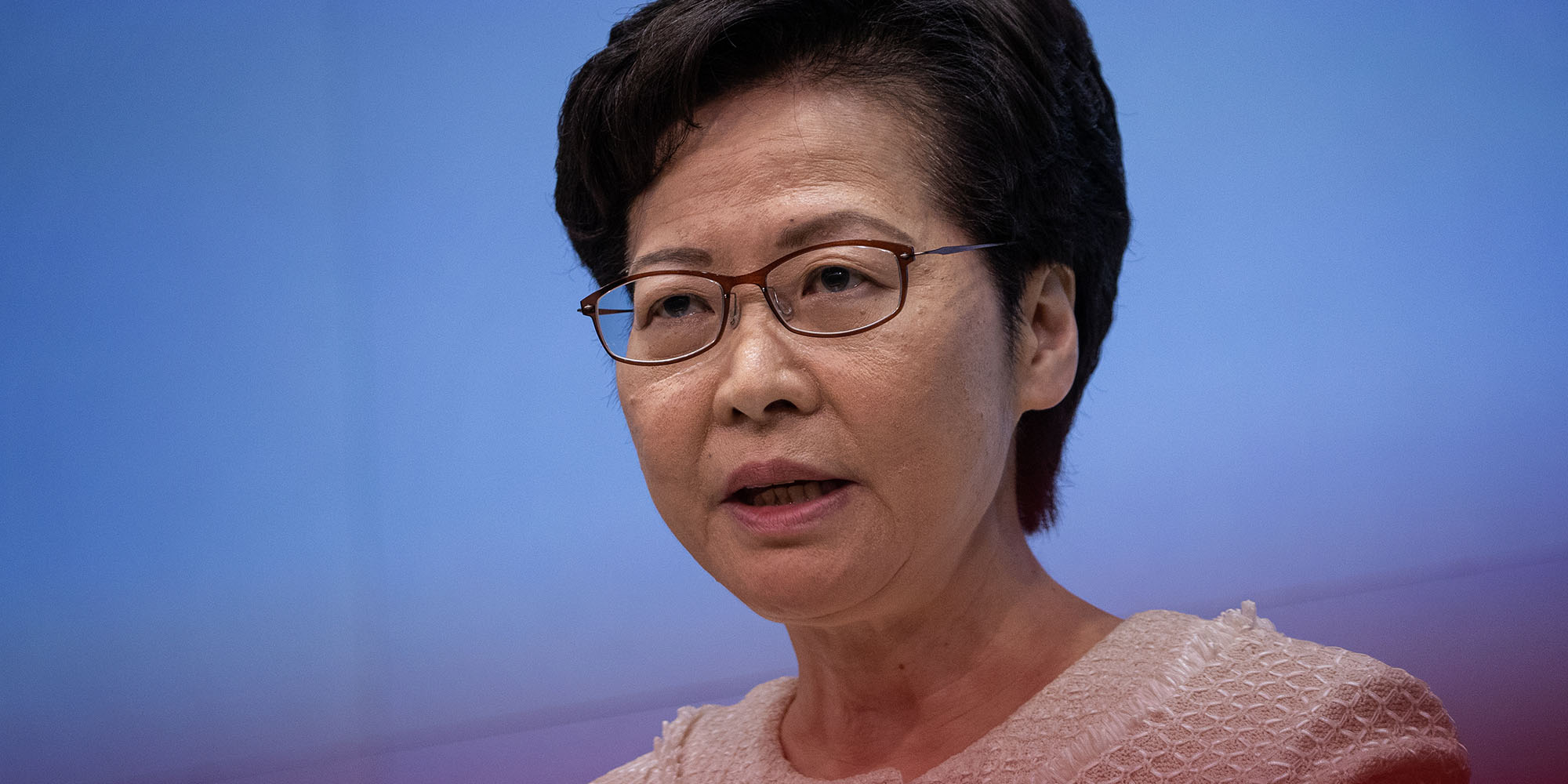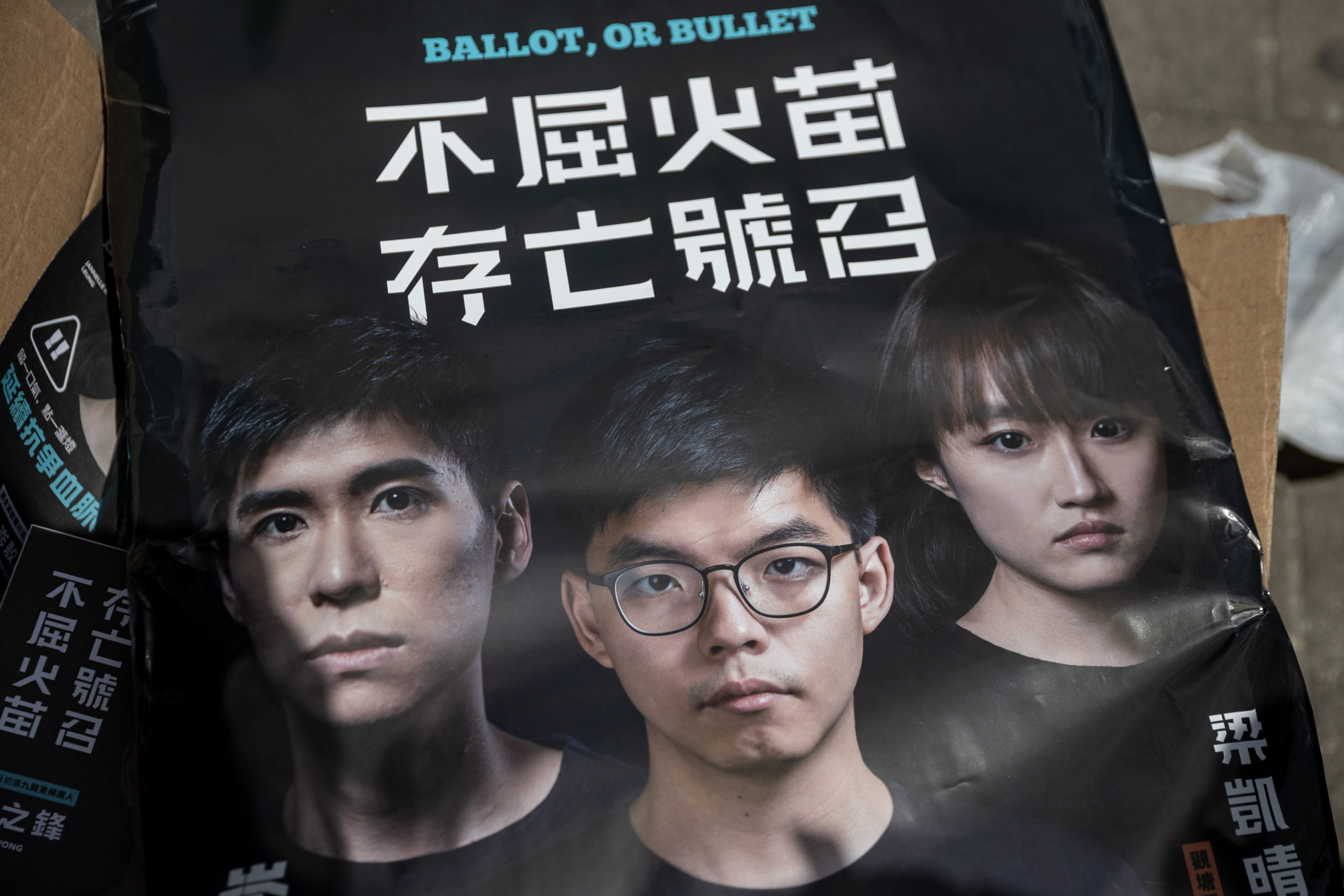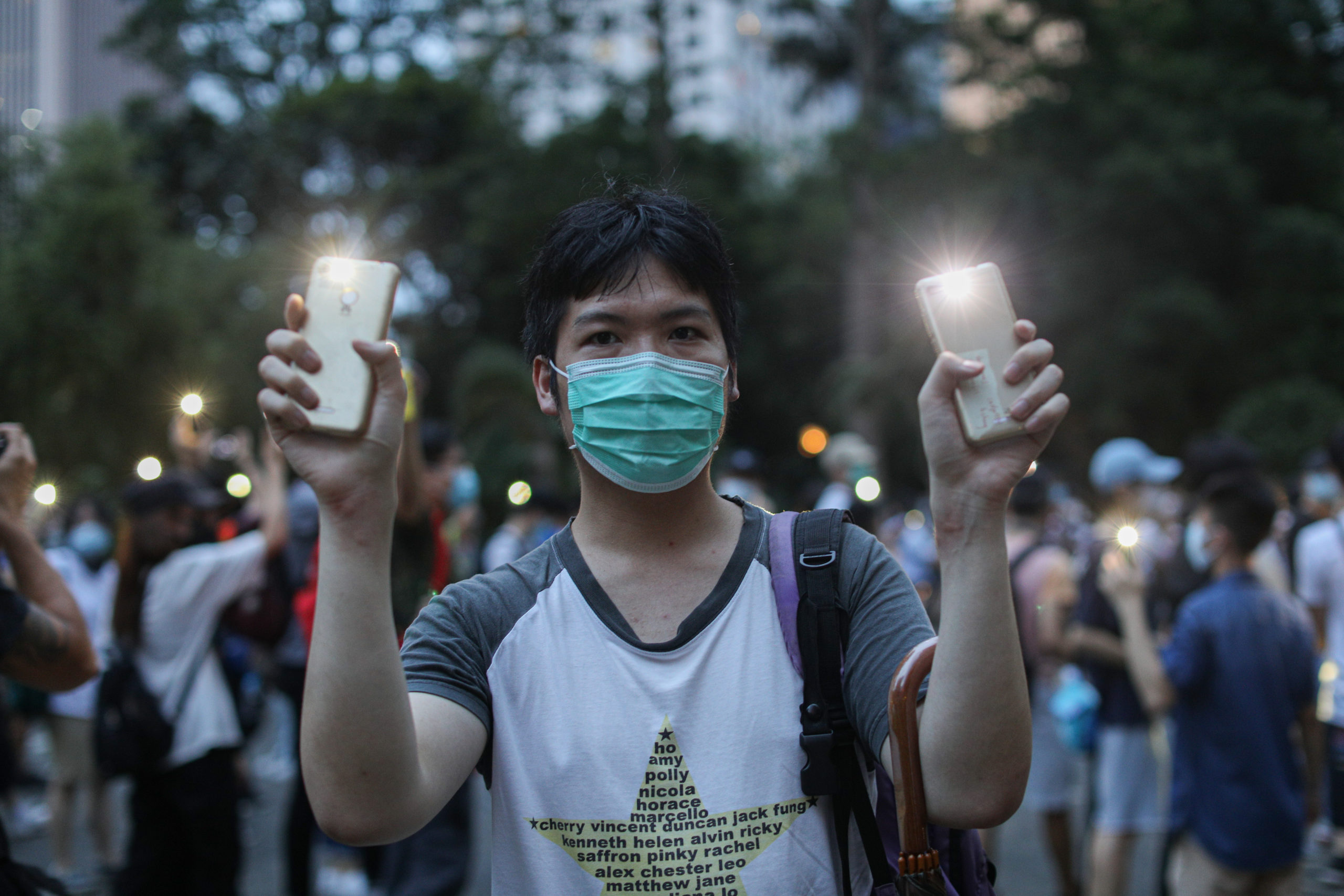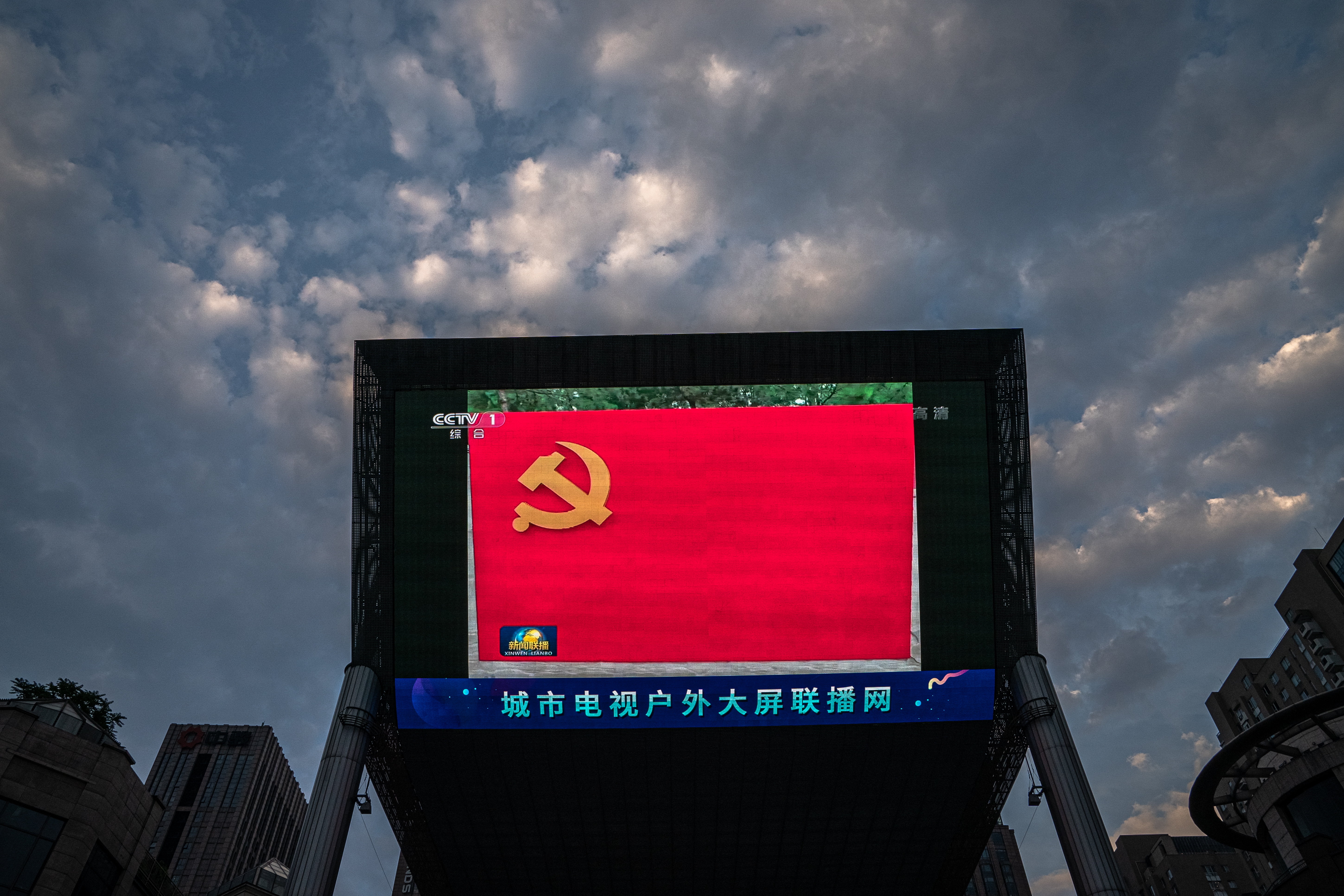Western and South African legal experts believe that the new security law violates the judicial independence which is enshrined in Hong Kong’s Basic Law, its “mini constitution”. And they contend the national security law also infringes the Sino-British Joint Agreement, the treaty which returned Hong Kong to China in 1997 and which also guaranteed Hong Kong judicial independence as well as “a high degree of autonomy” from Beijing, except in defence and foreign affairs.
These experts argue those fundamental principles have now been abandoned mainly because the new law allows Beijing to take over national security cases from Hong Kong, and prosecute and try them in China.
 Hong Kong Chief Executive Carrie Lam speaks during a press conference at the Central Government Offices in Hong Kong on 7 July 2020. (Photo: EPA-EFE / Jerome Favre)
Hong Kong Chief Executive Carrie Lam speaks during a press conference at the Central Government Offices in Hong Kong on 7 July 2020. (Photo: EPA-EFE / Jerome Favre)
The national security law establishes four categories of security crime; secession, subversion, terrorist activities and “Collusion with a Foreign Country or with External Elements to Endanger National Security”.
The Chinese government and its defenders vehemently insist that the law merely fills a long-standing gap in Hong Kong’s law by providing for national security as the laws of most countries do. China also insists that the law – which was drafted in Beijing, not in Hong Kong – is nonetheless consistent with Hong Kong’s own laws and with international norms.
The Chinese Embassy in Pretoria said the law “clearly stipulates that human rights shall be respected and protected in safeguarding national security in the Hong Kong Special Administrative Region.
“The rights and freedoms, including the freedoms of speech, of the press, of publication, of association, of assembly, of procession and of demonstration, which the residents of the Region enjoy under the Basic Law of the Hong Kong Special Administrative Region and the provisions of the International Covenant on Civil and Political Rights and the International Covenant on Economic, Social and Cultural Rights as applied to Hong Kong, shall be protected in accordance with the law.”
And Ronny Tong, former chairman of the Hong Kong Bar Association, and now a member of Hong Kong’s Executive Council, wrote in an article last week in the South China Morning Post, that it would be the Hong Kong “law enforcement and judicial authorities, both generally regarded as one of the finest in Asia, if not the world, that will be enforcing and adjudicating on the law”.
It is true that the Hong Kong law enforcement and judicial authorities are widely respected as capable and independent. And so, if and when they are given jurisdiction over security offences under the new law, these cases may indeed be handled fairly and independently of Beijing’s supervision.
 A election poster shows pro-democracy primary candidates for the legislative election Lester Shum, (L), Joshua Wong, (C), and Jannelle Leung, (R), during a campaign event in Hong Kong, China, 11 July 2020. Hongkongers' activists fear Beijing's security laws will harm democrats' chances of winning by banning anti-government candidates from September poll. EPA-EFE/JEROME FAVRE
A election poster shows pro-democracy primary candidates for the legislative election Lester Shum, (L), Joshua Wong, (C), and Jannelle Leung, (R), during a campaign event in Hong Kong, China, 11 July 2020. Hongkongers' activists fear Beijing's security laws will harm democrats' chances of winning by banning anti-government candidates from September poll. EPA-EFE/JEROME FAVRE
But “may” is the operative word. As Michael Blanchflower, a former assistant solicitor general of Hong Kong, who specialises in criminal law and human rights law, recently wrote, also in the South China Morning Post: “For national security law cases, the chief executive will designate judges at all court levels – from magistrates to justices of the Court of Final Appeal. Before making such designations, the chief executive may consult the committee and the chief justice of the Court of Final Appeal. But the chief executive does not have to consult anybody...”
This, among other provisions in the law, jeopardises Hong Kong’s treasured judicial independence, he wrote.
“Judicial independence has been a cornerstone of the Hong Kong Special Administrative Region’s legal system and is guaranteed by Article 85 of the Basic Law, which states: ‘The courts of the Hong Kong Special Administrative Region shall exercise judicial power independently, free from any interference.’
“The new national security law reneges on that guarantee,” Blanchflower concludes.
However, others see the real threat to Hong Kong’s judicial independence as lying elsewhere in the national security law. This is in its provision that the central government will establish, staff and fund an “Office for Safeguarding National Security of the Central People’s Government in the Hong Kong Special Administrative Region”.
The text of the national security law makes it clear that this is to be a separate – and superior – law enforcement bureaucracy of the central government in Hong Kong.
Article 55 of the law says that this office may “upon approval by the Central People’s Government of a request made by the Government of the Hong Kong Special Administrative Region or by the Office itself, exercise jurisdiction over a case concerning an offence endangering national security under this Law, if:
(1) the case is complex due to the involvement of a foreign country or external elements, thus making it difficult for the Region to exercise jurisdiction over the case;
(2) a serious situation occurs where the Government of the Region is unable to effectively enforce this Law; or
(3) a major and imminent threat to national security has occurred.”
In other words, the Chinese authorities, either in Beijing itself, or through the Hong Kong government or through this new Office, may decide on their own, without reference to the Hong Kong courts or prosecutorial authorities, to take over any case which they deem as fulfilling these broad criteria..
And Article 56 of the national security law says that when this Office assumes jurisdiction of a case, “the Supreme People’s Procuratorate shall designate a prosecuting body to prosecute it and the Supreme People’s Court shall designate a court to adjudicate it”.
These two are, of course, Chinese bodies based in Beijing. So they could very well choose to hand over the cases to Chinese prosecutors and Chinese courts rather than those in Hong Kong, says Chinese law expert Professor Martin Flaherty, Professor of International Human Rights Law, at the Leitner Centre of International Law and Justice, Fordham Law School.
 An activist takes part in a rally marking the first year anniversary since a million people marched against the now-scrapped extradition bill in Hong Kong, China, 09 June 2020. The protests against the extradition bill protest morphed into months of anti-government unrest. EPA-EFE/JEROME FAVRE
An activist takes part in a rally marking the first year anniversary since a million people marched against the now-scrapped extradition bill in Hong Kong, China, 09 June 2020. The protests against the extradition bill protest morphed into months of anti-government unrest. EPA-EFE/JEROME FAVRE
In an Op-Ed in the Washington Post, he wrote that the “national security law for Hong Kong heralds nothing less than imperialism with Chinese characteristics.
“The key to this approach is the law’s adoption of a separate and draconian judicial system. In certain broad circumstances, an office of the mainland government in Hong Kong can now refer a case to mainland prosecutors and courts. Apparently, Hong Kong’s own common law courts are not up to dealing with security threats.”
Flaherty also pointed out to Daily Maverick that Article 57 of the national security law made it quite explicit that in cases where the Office for Safeguarding National Security took over a case, the applicable procedural law would be Chinese as would the substantive law which would be the national security law.
Article 57 says, “The Criminal Procedure Law of the People’s Republic of China and other related national laws shall apply to procedural matters, including those related to criminal investigation, examination and prosecution, trial, and execution of penalty…” in these cases.
It would seem that Beijing has taken advantage of the world’s distraction by the Covid-19 pandemic to use the national security law to impose control over Hong Kong’s pro-democracy movement, which it feared to do at the height of the protests in 2019 when all the world was watching closely.
There have been some protests against the national security law, but nothing like those of 2019. And Beijing has also evidently managed to bring in, by the back door, the specific issue which sparked violent protests in 2019 – the proposed amendments to the Hong Kong law to allow for the extradition of Hong Kong citizens and others – to mainland China.
Hong Kong’s Chief Executive Carrie Lam eventually withdrew these proposed amendments to the extradition law in the face of the huge and sometimes violent protests. But now, under the new national security law, if the Chinese authorities decide to try a security case in China rather than Hong Kong, the suspects will presumably be extradited automatically to China.
The defenders of the new law point out, however, that, Article 50 of the law states that the Office for Safeguarding National Security “shall perform its mandate in strict compliance with the law and be subject to supervision in accordance with the law. It shall not infringe upon the lawful rights and interests of any individual or organisation.
“The staff of the Office shall abide by the laws of the Hong Kong Special Administrative Region as well as national laws.”
Flaherty regards this as “a hollow assurance”, given China’s “record on crushing any form of dissent”.
And in any case, Article 60 makes it clear that national – i.e. Chinese – law will trump Hong Kong law, by stipulating that the Office for Safeguarding National Security and its staff “shall not be subject to the jurisdiction of the Hong Kong Special Administrative Region”.
As Flaherty spells out: “This means that mainland authorities are exempt from Hong Kong law.”
And he also points out that Article 38 purports to extend the law beyond Hong Kong “to any person anywhere in the world who violates its provisions”.
Article 38 says: “This Law shall apply to offences under this Law committed against the Hong Kong Special Administrative Region from outside the Region by a person who is not a permanent resident of the Region.”
Daily Maverick asked Flaherty if he agreed, though, with China’s contention that most states, including Western democracies, have similar national security laws, which permit the suspension of basic democratic rights in cases of dire threats to national security.
“That would require a long answer. But it is similar to emergency and security laws in Northern Ireland, Turkey and many former British colonies that have a second-track security court system with few safeguards and systematic abuse. The PRC (People’s Republic of China) will likely be worse,” he says, citing “its readiness to incarcerate one million Uighurs” in its restive, Muslim-majority, western-most province of Xinjiang.
Nicole Fritz, executive officer of South Africa’s Freedom Under Law, also believes that: “The offences criminalised in the law are vague and overbroad — so often the case with laws targeting terrorism, treason, sedition.
“But it is the increased space the legislation gives to China’s security apparatus in Hong Kong that is especially frightening and the prospect that those detained for the offences criminalised will be spirited off and made subject to the judicial structures of China and not Hong Kong that also invites real alarm. Again, the law is worded so vaguely and imprecisely, affording so much discretion to Chinese authorities, that it is hard to know how extensive its felt effects will be.
“But it is clearly an enormously powerful tool in authoritarian hands.”
Daily Maverick asked Flaherty how differently Beijing should have dealt with the rising levels of protest in 2019.
“It should have conceded to the legitimate demands of the protestors, among other things, withdrawing the extradition bill much earlier than it did, dealing with police brutality, and democratising Legco (Hong Kong’s Legislative Council), and the election of the Chief Executive as promised under the Basic Law.”
Does he believe the new national security law has sounded the death knell for Hong Kong’s relative autonomy and therefore the “one country, two systems” (1C2S) philosophy, which has been its foundation since 1997?
“It already is doing so,” Flaherty said. “Books are being pulled from libraries. Figures like Nathan Law have left,” he added, referring to the former activist and politician who announced on 2 July 2020 that he had left Hong Kong because of then impending national security law.
“Given the PRC’s track record under Xi Jinping, it is hard to see how the NSL is anything other than the death knell of 1C2S,” Flaherty said.
Fritz found it “sinister... that the Chinese government sought to provide spin on the law even before a draft was released — witness half-page adverts on page 3 in Business Day — without making any drafts available for independent analysis and critique before it was promulgated…”.
“They have introduced a draconian law without transparency and are desperately seeking to control the narrative around the law in order to blunt any international condemnation.
“We have reason to worry that global circumstances will, in fact, help ensure weakened condemnation: The pandemic is monopolising so much attention, but various countries’ reliance on China’s assistance at this time (e.g SA and other African states), makes for disincentive to condemn.” DM




 An activist takes part in a rally marking the first year anniversary since a million people marched against the now scrapped extradition bill in Hong Kong, China, 09 June 2020. The protests against the extradition bill protest morphed into months of anti-government unrest. EPA-EFE/JEROME FAVRE
An activist takes part in a rally marking the first year anniversary since a million people marched against the now scrapped extradition bill in Hong Kong, China, 09 June 2020. The protests against the extradition bill protest morphed into months of anti-government unrest. EPA-EFE/JEROME FAVRE 